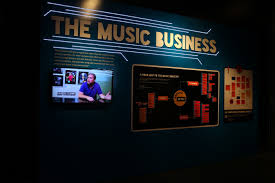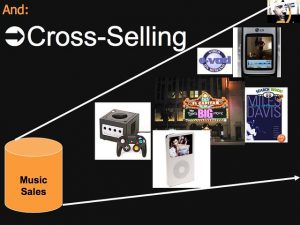
So you wanna be a rock 'n' roll star...
It's the music business.
The music business has two main parts - music and business. Both are important, and you won't get very far if you neglect either one. It isn't enough to simply be a talented singer or musician. It isn't enough to 'have a head for business'. To be truly successful in the music business, you need to have both artistic talent and business acumen. In this article, we'll dive into 13 Keys to Music Business Success (for Singer-Songwriters and other Indie Musicians).
In his book, The 7 Habits of Highly Successful People, Steve Covey identified seven key principles for success in life. In The Success Principles™, How to Get from Where You Are to Where You Want to Be, educator Jack Canfield has identified no less than 65 success principles, that he divided into six sections. Motivational speaker and author Brian Tracy has identified The 100 Absolutely Unbreakable Laws of Business Success, divided into eight chapters.
To be sure, there is much overlap between them and much to be learned from those authors. I encourage you to read and study those habits, principles and laws to identify which you might need to develop. For now, we're going to focus on a select few. Use them to unlock the secrets of what it takes to make it as an artist. Ignore them at your peril.
1. Write great songs! (Or you can't turn a sow's ear into a silk purse.)
The music business has two main parts - music and business. Both are important, but you won't get very far unless you have great material. As important as the business side is, even more important is writing great songs.
In a recent Taxi TV episode, Tony van Veen, CEO of DIY Media Group (parent company of Disc Makers, Merchly, BookBaby, and until recently, CDBaby), told viewers, "I see this in my factory... I'll see a CD that looks great and I might want to listen to it, or I'm at a conference and somebody hands me a CD... that’s really interesting... and you pop it in and it sounds great, and the lead-in sounds promising, and then the song doesn’t go anywhere. Nothing is as big a turn-off for me... it's just not a good song." According to van Veen, "A great song does not guarantee success, but a mediocre song guarantees failure."
With the recording technology that's available today, virtually anyone can make technically proficient recordings. In fact, many artists can turn out polished, great sounding, well-produced recordings with a $200 mic, a laptop and some really inexpensive software.
For example, one songwriter I know (we'll call him Steve) spent literally tens of thousands of dollars in demo studios with professional musicians. Unfortunately, he never wanted any critical feedback and rarely re-wrote any of his songs. The results were predictable: great sound, but poor to mediocre songs that few people wanted to hear twice. The pro musicians he used had great musical chops, but their technical virtuosity wasn't enough to salvage his lackluster writing.
Keep An Open Mind
Too many singer/songwriters and indie musicians seem to have the attitude that as artists, whatever they create is therefore art. If you don't 'get it', it's not their fault that you're too dense. Like Steve, they don't handle criticism well, and they don't spend much time rewriting songs.
But there's a difference between 'expression' and 'communication.' As the songwriter, your job is to communicate, not merely 'express yourself.' Whether you're communicating an emotion or telling a story, you have a few minutes of lyrics, melody, rhythm and harmony to get your point across. If the listening audience doesn't understand what you were trying to express, you haven't done your job.
The first key to music business success is to have a great product, and that means great songs. Study hit songwriters in your genre. Study all the elements of song craft and learn how to apply them. Write, re-write, get feedback, and re-write again. Repeat the process until the song is the best it can be. Apply what you learn to the next song. Keep repeating that process until all your great ideas become great songs.
2. Keep your day job (until you can live on what you make from music)
You need to support yourself and your family. If you like to eat and live in relative comfort, you need enough income to pay the bills that your lifestyle demands. If you can do that with music, great; otherwise, regular work is your best bet for steady income. If you already have a great job that you enjoy, keep it. If not, look for something that doesn’t suck your life energy AND ideally gives the flexibility to gig.
I met Nick Annis, a touring folk musician, when I was organizing a house concert series to fund a Kid Pan Alley residency at my kid’s local school. Annis lives in a small camper while on the road and carries his carpentry tools with him. He’s built decks, and done other home repairs and renovations on the road between gigs to make ends meet. (And wrote a great song about Home Depot in the process!)
Radon Purcell creates production music for film and TV. He gets up at 4:30 am every morning to work on his music for two hours before his family gets up, then he goes to work at his day job.
3. Be business-like
You are a small business person, so act like one. You’ve hired yourself for a part-time job selling entertainment products and services. You can’t just show up when the mood strikes you and expect to be successful. The hallmark of successful business is the ability to be organized and disciplined. This includes paying attention to ALL the little details, from managing your budget to your calendar.
Consider folk and country singer/songwriter Lori McKenna, who had the good “luck” to have country superstars Faith Hill and Tim McGraw record a bunch of her songs (Girl Crush, Humble and Kind, among others). But Lori’s good fortune wasn’t an ‘out-of-the-blue’ overnight miracle. Her hard work over many years - touring, releasing several CD’s with national distribution, and developing important music industry connections – led to her success.
4. DIY or work for hire?
 You’re a creative talent. The time you spend engineering, producing, designing, marketing, managing, booking, accounting, publicizing, etc. is less time for songwriting, recording and performing. That said, those jobs still have to get done.
You’re a creative talent. The time you spend engineering, producing, designing, marketing, managing, booking, accounting, publicizing, etc. is less time for songwriting, recording and performing. That said, those jobs still have to get done.
The only reason to do any of the many jobs that your small business requires is that you can do it better, faster and/or cheaper than it will cost to hire someone to do it for you – and you like doing it.
One guitarist I met many years ago came up with a killer strategy as his band’s booking agent. He told me that when he was ‘just Joe the guitar player’, he had trouble getting club managers and festival promoters to take him seriously. So he created an alias, added a business phone line, and became ‘Mr. Joseph, the booking agent’. He got more return calls, which led to more gigs, and eventually a career creating commercial music for local businesses.
5. Study, study, study
If you really want to learn a business, you have to start on the ground floor and work your way up. Like the guitarist/booking agent, you’re going to have to learn how to do the jobs you decide to do yourself. Find people who are doing those things now, and study them. Be curious, inquisitive and observant. Ask questions and take notes. Try out different strategies, with regard to both your music and the business side.
As a presenter, I used to have trouble getting workshop participants to return from a small group activity. I didn’t like calling out over the group or wasting time getting everyone focused on me again. Then I went to a workshop and saw a wonderful solution that I’ve used ever since.
“Clap once if you can hear me,” the presenter said in a normal tone of voice. A few people around him gave him one clap. “Clap twice if you can hear me,” he continued. A few more people gave two claps. “Clap three times if you can hear me.” About a third of the room clapped three times. By four claps, he had everyone’s attention – and he thanked them for the ovation – all without raising his voice or breaking a sweat. I’ve used that technique in every presentation I’ve given ever since – with similar results.
6. Know your limitations (to overcome them)
You may be extremely talented, but if your particular talents don’t align with your musical and creative goals, you might wind up extremely disappointed. You first need to carefully assess your talents and abilities; next you need to decide whether you can improve your deficits or if you need to accept them and change your goals and direction.
I first read Linda Septien’s remarkable story in Dan Coyle’s awesome book, The Talent Code. A classically trained opera singer, in 1984, Septien decided to try country music – and failed. Instead of quitting after her producer’s assessment (“You suck. You have no feeling at all.”), she took two years off from performing to figure out what that meant.
“Three hundred concerts and a ton of research” later, she realized she could teach what she had learned. Septien became a vocal coach, and what a coach! Now the CEO of Septien Group, her resume includes a veritable ‘who’s who’ of singers. She's worked with Jessica Simpson, Demi Lovato, Selena Gomez, Beyoncé Knowles, Destiny's Child, half a dozen American Idol finalists, three Broadway performers and a handful of child stars, among others (source).
7. And speaking of The Talent Code…
According to psychologist Anders Ericsson, the 10-year, 10,000-hour rule says that it takes roughly that long to become an expert in any field, from music to athletics to rocket science. But simply spending 10,000 hours over 10 years doing something won’t make you great at it. That requires what Coyle calls ‘deep’ or deliberate practice. To crack the talent code and make it work for you, you must apply the Three Rules Of Deep Practice
Rule 1: Chunk it… 
- Chunk it up: Absorb the skill as a whole. This consists of observing and listening over and over again until you can see yourself doing the complete task effortlessly.
- Chunk it down: Break it into bite-sized component parts. Just as sentences are composed of words that are made up of letters, every skill you’ll ever learn has discrete parts. Take a complex action apart and learn it one random, discrete piece at a time.
- Link the pieces together into larger groupings: notes become riffs, riffs become measures, measures become phrases, phrases become sections, sections become verses, choruses and bridges, and verses, choruses and bridges become songs.
- Practice each discrete part, then each combination of parts, super slow. This works for two reasons. First, slowing down allows you to pay closer attention to mistakes and enables greater precision. Second, slowing down will help you develop something even more important: a deep understanding of the skill’s composite map – the interconnected rhythms and contours of the skill’s basic parts.
- As Vince Lombardi famously said, “Practice doesn’t make perfect – perfect practice makes perfect.” Football quarterbacks coach Tom Martinez often echoes this wisdom: "It's not how fast you can do it. It's how slow you can do it correctly."
Rule 2: Repeat it.
- If the secret to real estate has always been location, location, location, the way to Carnegie Hall has always been practice, practice, practice. And science can now explain why.
- Deep practice is the ability to challenge yourself, fail and correct the failure, continuously ‘building and honing’ your neural circuits right at the edge of your capability. It’s hard to do because staying in the sweet spot of deep practice is exhausting, and most of us are only willing to do that consistently for something we really love.
- Practice builds connections between neurons; deep practice makes those connections stronger by producing layers of myelin, the insulation that surrounds the neural fibers that connect neurons (the brain’s “wiring”), making the electrical impulses flow faster and truer.
Rule 3 : Learn to feel it.
- Ironically, everyone begins life applying the talent code to some very basic skills: language and walking. None of us can consciously remember the experience of learning to walk or talk, but it is the most natural learning process. Just watch babies looking and listening as people around them speak. Research shows that infants begin to understand language a good three months before they even attempt their first words. Think about toddlers learning how to walk, and you can easily see the process in action. They watch older people walking. As soon as the large muscles in their legs are strong enough, they give it a try. They fall down a lot, but they get up and try, try, try again and before you know it, they’re off and running.
- Learning in this way creates implicit memory: you don’t have to think about how to do it, you can just do it.
- In the Talent Code, Coyle quotes then-14-year old cellist John Henry Crawford on what deep practice feels like. Said Crawford, "It’s a thought thing. When I click in, every note is being played for a purpose. It feels like I'm building a house. It feels like, this brick goes here, that one goes there, I connect them and get a foundation. Then I add the walls, connect those. Then the roof, then the paint. Then, hopefully, it all hangs together." (source: pp 87, The Talent Code)
The difference between pros and amateurs is that pros are able to see and respond to underlying patterns in real time; they don’t have to think about technique while they’re playing, which allows creativity to kick in and makes what they do look effortless and fluid.
8. Become known as a ‘class act’
Like every other business, the music business is a PEOPLE business. No matter who you’re dealing with – your fans, band mates, manager, venue staff, record company or publisher, from the lowliest secretary to the most powerful VIP – if you treat others the way you want to be treated you’ll get further ahead a whole lot quicker. Why? All things being equal, if people have to choose between an ‘impossible to please prima donna’ or someone who is easy to work with, that’s when nice guys finish first.
Class act’s are people who others want to emulate – not simply because they’re talented or successful, but because they're likable: polite, courteous, professional and friendly. Your music business success will be directly co-related with the relationships you build along the way.
9. Speaking of courtesy…
As many coaches are fond of saying, early is on time, on time is late and late is unacceptable. Planning to show up early for your gigs will allow you to be relaxed before you go on stage. Plus, you will have plenty of time to deal with unexpected events and may even help you avoid a few (like the traffic jam that you would’ve been stuck in if you’d left 30 minutes later).
Once you’re at the gig, you still need to keep an eye on the clock, especially if you’re opening for another artist. If you’re given 30 minutes for your set, make sure you’re off the stage at 29 minutes. Thank the headliner, thank the host, thank the audience and remind them to tip their bartenders and waitresses. Most importantly, leave them wanting more. That's a sure key to music business success.
10. And speaking of fans…
The music business is the ENTERTAINMENT business. That means that you’re not simply writing or performing to please yourself. (You could do that in the comfort of your living room for your mom and dad.) Any success you have will be directly the result of how well you cultivate your fan base. That means you need to learn who your fans are, then work to solidify and expand your base. Today’s fans want to interact with the artist, and that’s possible given today’s social media outlets.
Taylor Swift is a master at knowing and engaging her fan base. Consider that when Bob Dylan moved from acoustic folk to electric rock, a significant percentage of his fans revolted, but when Swift moved from country to pop, her fan base followed her without hesitation. Her music business success is intimately connected to her fan base. And she provides exceptional value, even showing up unannounced at random fan club member's homes with gifts from time to time.
11. If a tree falls in a forest, and no one sells it for lumber, did it really fall?
 Did I mention that it’s the music BUSINESS? The purpose of every business is to sell something, and all of them – from pharmaceutical companies to orange growers – use marketing. By some estimates, major record companies invest upwards of about $1 million to make a song a hit.
Did I mention that it’s the music BUSINESS? The purpose of every business is to sell something, and all of them – from pharmaceutical companies to orange growers – use marketing. By some estimates, major record companies invest upwards of about $1 million to make a song a hit.
According to Ray Daniels, who manages songwriter brothers Timothy and Theron Thomas (aka “Rock City”), part of the co-writing team for the song ‘Man Down’ by Rihanna, "The reason it costs so much is because I need everything to click at once. You want them to turn on the radio and hear Rihanna, turn on BET and see Rihanna, walk down the street and see a poster of Rihanna, look on Billboard, the iTunes chart, I want you to see Rihanna first. All of that costs." A hit song is everywhere at once and the label pays big bucks to make that happen (source).
Unless you don’t care about making money from your music, that means marketing. If you have a record company deal, their marketing department will do most of that work for you. But to paraphrase Harold Hill in The Music Man, if you’re not marketing yourself or your music, you’ve got trouble with a capital T and that rhymes with D and that stands for dollars which you won’t make without it. You can hire a publicist or DIY, but either way, no marketing means fewer sales. Which leads us to…
12. Always put your best foot forward!
Sure, you could have the drummer’s girlfriend use your iPhone for your photo shoot. But unless she’s a professional photographer, you’re going to get what you paid for. And your publicity photo is one area that you don’t want to skimp on if you want to be taken seriously. The newspaper industry may be on it’s last legs, but it’s not dead yet. Since the paper’s photo editor (not the music review staff) is the one who makes the decision on which photo to run, a photo with a caption is worth more than the proverbial thousand words.
Similarly, while CD’s may also be a dying medium, if you produce one, the same principle holds true. This is another area where hiring out pays off. Use professionals for the cover art and design so that the package looks as good as your music sounds. You might have the best chop house on the block, but if they can’t hear the sizzle or smell the aroma, they might never taste the steak.
13. And speaking of performance, you never get a second chance to make a first impression.
Always play like your career depended on it. Sure, it’s easy to get excited about a gig playing for a packed house or in a hallowed venue like the Bluebird Café, Carnegie Hall or the Grand Ol’ Opry. It’s another matter to give the same killer performance when the only people in the room besides you, your band mates and the sound man are the bartender, wait staff and a few paying customers. If that’s the case, assume that the heads of every major record label are in the audience, and you want to create a bidding war to sign you.
On February 2, 1977, Van Halen was playing Hollywood’s Starwood Club. Unbeknownst to them, acting on a tip, Ted Templeman, a legendary Warner Brother’s producer, was watching them tear it up from the back of the room. “I saw Ed, and I was just fucking knocked out. He was the best musician I’d ever seen in person,” said Templeman. “Dave (Lee Roth) was playing to an audience of ten thousand, where there were about eleven people in there. He was performing and sweating and jumping whether anybody was there or not. He was wearing outrageous clothes.” Templeton didn't stay long, but he knew almost immediately that he wanted to sign them, and came back the next night with Mo Ostin, a Warner exec who could make the deal.
Eddie Van Halen confirmed the tale in a 1978 interview with Guitar Player magazine. “It was an empty house at the Starwood on a rainy Monday night, and all of a sudden, Marshall walks in with Ted Templeman and Mo Ostin. It was heavy… Within a week, we were signed. It was right out of the movies.” (source)
Whoever said luck is the intersection of preparation and opportunity was right!
In Summary...
Practice these 13 Keys to Music Business Success to be ready for the opportunity when it comes a-knockin', make the most of your talent and keep on rockin'!